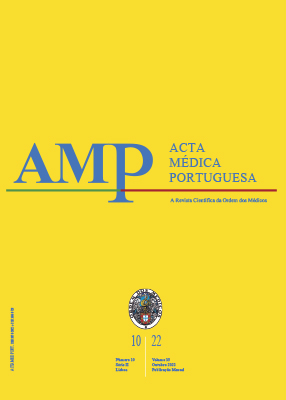The First Documented Case of Hb South Florida Variant in Portugal
DOI:
https://doi.org/10.20344/amp.16052Keywords:
Diabetes Mellitus, Glycated Hemoglobin A, Hemoglobins, AbnormalAbstract
We present a 39-year-old male, previous smoker, with no other known cardiovascular risk factors. He was referred to Internal Medicine for study of thrombophilia, because of repeated deep vein thrombosis. Multiple diagnostic tests were undertaken where HbA1c assay was included. The result was 14.6%. The patient did not have a prior diagnosis of diabetes and denied any symptoms. Fasting blood glucose and blood count did not reveal any changes. A further analysis of hemoglobin subtypes showed the presence of an unclassified variant. The sample was sent to a Portuguese reference center and, through molecular biology, an HBB mutation in heterozygosity was identified, coding for an hemoglobin variant - Hb South Florida (c.4G > A; p.Val2Met), which was for the first time documented in Portugal. We emphasize the importance of considering the presence of hemoglobin variants when HbA1C values are discrepant from the clinical presentation.
Downloads
Downloads
Published
How to Cite
Issue
Section
License
Copyright (c) 2022 Acta Médica Portuguesa - Ordem dos Médicos

This work is licensed under a Creative Commons Attribution-NonCommercial 4.0 International License.
All the articles published in the AMP are open access and comply with the requirements of funding agencies or academic institutions. The AMP is governed by the terms of the Creative Commons ‘Attribution – Non-Commercial Use - (CC-BY-NC)’ license, regarding the use by third parties.
It is the author’s responsibility to obtain approval for the reproduction of figures, tables, etc. from other publications.
Upon acceptance of an article for publication, the authors will be asked to complete the ICMJE “Copyright Liability and Copyright Sharing Statement “(http://www.actamedicaportuguesa.com/info/AMP-NormasPublicacao.pdf) and the “Declaration of Potential Conflicts of Interest” (http:// www.icmje.org/conflicts-of-interest). An e-mail will be sent to the corresponding author to acknowledge receipt of the manuscript.
After publication, the authors are authorised to make their articles available in repositories of their institutions of origin, as long as they always mention where they were published and according to the Creative Commons license.









